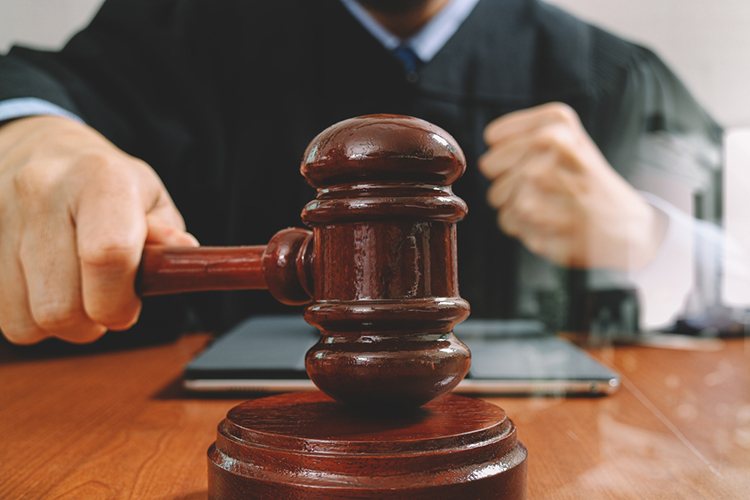State orders training for judges after rape comment controversies; 'good family' judge resigns

Photo by everything possible/Shutterstock.com.
Judges throughout New Jersey will undergo enhanced training following media coverage of controversial remarks made by judges in sexual assault cases.
The mandatory training will focus on sexual assault, domestic violence, implicit bias and diversity, according to a press release by Glen Grant, acting administrative director of New Jersey courts. A group of 12 judges will review training programs already in effect and make improvements, according to an announcement by New Jersey’s chief justice, Stuart Rabner, who asked Grant to act.
The training focus follows media coverage of judges’ remarks in sexual assault cases that drew outrage and protests, report the New York Times, NJ Advance Media and the Asbury Park Press. One part-time judge at the center of the firestorm resigned, and the state brought ethics charges against another.
The judge who resigned, James Troiano of Monmouth County, had remarked that a 16-year-old sexual assault defendant was from a “good family” and ruled he should not be tried as an adult. The other judge, John Russo, the former mayor of Toms River, had asked a woman seeking a restraining order whether she could have avoided forced sex by closing her legs.
The judicial training will “enhance understanding of the complexities and nuances associated with sexual assault, sex offenses and domestic violence matters,” Grant’s press release said.
“It will also raise awareness of the impact of implicit bias on decision-making, while providing skills for judges to recognize and respond to their preconceptions,” the press release said. “The programs also will train judges in effective communication skills that will aid them in delivering clear decisions that are rooted in the law, respectful of victims and understandable to the public while protecting the rights of the accused.”
The courts are also developing an online portal that will allow members of the public to provide anonymous feedback on their court experiences.
Pete McAleer, communications director for New Jersey courts, tells the ABA Journal that courts in the state already train judges on handling sexual assault and domestic violence cases, and the enhancements are still being developed. He also said the courts use ABA materials on implicit bias in its training program.
All judges in New Jersey are required to be lawyers, and all judges will have to take the training, McAleer said.
Last month a New Jersey appeals court overturned the July 2018 decision by Troiano that refused to allow a 16-year-old youth to be tried as an adult in a case accusing him of sexually assaulting a 16-year-old girl at a pajama party. The accused had been drinking and the girl was “visibly drunk,” the appeals court said.
The boy recorded the encounter on his cellphone and sent the recording to his friends. He also sent them a text that said, “When your first time having sex was rape.”
The videos were deleted at the request of police after the girl’s mother contacted authorities about the recording. When the boy asked his friends to delete the video, he asserted he had sex with the girl but didn’t rape her. “Calm down,” he told his friends.
The appeals court noted Troiano’s comments at the hearing on whether to try the youth as an adult. The judge questioned why the mother didn’t pursue criminal charges until the video had been deleted and said the boy was “just a 16-year-old saying stupid crap to his friends.”
“This young man comes from a good family who put him into an excellent school where he was doing extremely well,” Troiano said. “He is clearly a candidate for not just college but probably for a good college. His scores for college entry were very high.”
The judge also expressed concern that the prosecutor had not explained the devastating effect on the boy’s life of prosecuting him as an adult.
The appeals court said Troiano sounded as if he was conducting a bench trial on the allegations rather than neutrally reviewing prosecutors’ application to try him as an adult.
“That the juvenile came from a good family and had good test scores we assume would not condemn the juveniles who do not come from good families and do not have good test scores,” the appeals court said.
Troiano had retired in December 2012, but he was working part time as a “recall” judge to help address court backlogs.
In Russo’s case, the New Jersey Supreme Court filed documents seeking his removal and ordered him suspended without pay until a final decision in the case.
A majority of the New Jersey Supreme Court Advisory Committee on Judicial Conduct had recommended only a three-month suspension for Russo.
Russo not only questioned the woman about how she could have fended off an attacker by blocking body parts or closing her legs, he also made “infantile” remarks to court staffers after the hearing, according to the advisory committee. Russo asked court staffers: “What did you think of that? Did you hear the sex stuff?”
Rabner stressed the need to protect the victims of sexual assault and domestic violence in a statement announcing the ethics charges. “Sexual assault is an act of violence,” Rabner said. “It terrorizes, degrades and induces fear in victims. Without question, it is a most serious matter in which fault lies solely with the perpetrator, not the victim.”
He also said that judges are entitled to a fair process in discipline matters. “In the rare case when a judge’s conduct calls for ethical review and potential discipline, the process requires a careful examination of the full record in context, not a rush to judgment,” he said.
Additional resources:
The ABA Judicial Division has published a book on implicit bias called “Enhancing Justice: Reducing Bias.”
The ABA Diversity and Inclusion Center has online videos and a toolkit exploring the problems of implicit bias in the justice system and ways to combat it.



